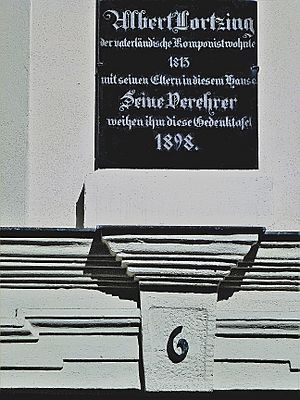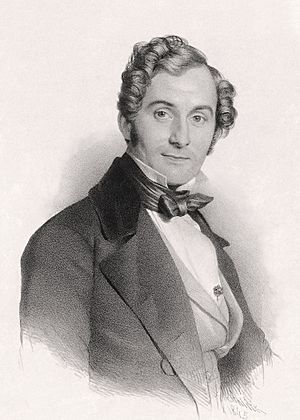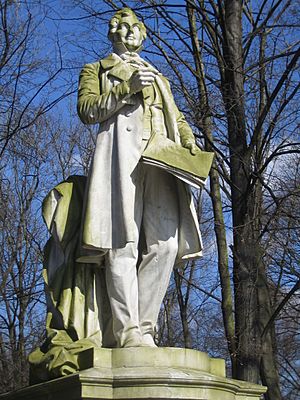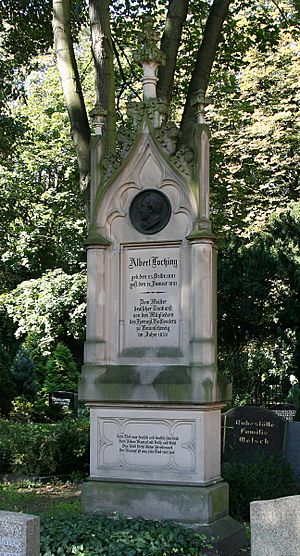Albert Lortzing facts for kids

Gustav Albert Lortzing (born October 23, 1801 – died January 21, 1851) was a talented German composer, writer for operas (librettist), actor, and singer. He is best known for his German Spieloper (pronounced: shpeel-OH-per) works. This type of opera is like a fun play with music, similar to French opéra comique (oh-peh-RAH koh-MEEK), and it grew from an older style called Singspiel (SING-shpeel).
Life and Career of Albert Lortzing
Albert Lortzing was born in Berlin, Germany. His parents, Johann Gottlieb and Charlotte Sophie Lortzing, used to own a leather shop. But they loved acting so much that they decided to become professional actors! They traveled all over Germany, performing in different towns. They even started their own theater group called Urania in Berlin.
Albert started performing on stage when he was just 12 years old. He would entertain the audience with funny poems during breaks in the show. From 1817, his family joined a group called the Josef Derossi ensemble. They performed in cities like Bonn, Düsseldorf, and Aachen. Albert quickly became a favorite with the audience. He often played roles like a young lover, a country boy, or a fun-loving person. Sometimes, he also sang small parts as a tenor or baritone.
On January 30, 1824, Albert married actress Rosina Regine Ahles. They had 11 children together! From late 1826, the couple worked at the Hoftheater (court theater) in Detmold. This theater group also toured to other cities like Münster and Osnabrück. While in Detmold, Lortzing joined the Freemasons. This was a popular group for artists at the time.
In Detmold, Lortzing wrote an oratorio (a large musical piece for voices and orchestra, usually on a religious theme) called Die Himmelfahrt Christi (Christ's Ascension). It was first performed in Münster. The local governor wasn't very impressed, saying Lortzing was "a composer of no renown."
Lortzing also wrote music for a play called Don Juan und Faust by Christian Dietrich Grabbe. Lortzing himself played the role of Don Juan, and his wife played Donna Anna. A newspaper review praised Lortzing for the music and mistakenly for the play's text. The real writer, Grabbe, was upset, but the review still helped make the play more famous.
On November 3, 1833, Albert and Rosina Lortzing made their first appearance at the Leipzig Stadttheater. Albert's parents had already been part of this theater group since 1832. In Leipzig, Lortzing joined an artists' club and another Freemasons lodge. He was very popular in the Leipzig group, especially when acting in comedies. However, he often liked to make up his own lines and change the script, which sometimes got him into trouble with the theater rules.
His first funny opera, Zar und Zimmermann (Tsar and Carpenter), faced some challenges with the Leipzig censors. It premiered in Leipzig on December 22, 1837. Lortzing himself sang one of the main roles. The opera didn't become a big hit until it was performed in Berlin in 1839, where it received much praise.
In 1844, Lortzing became the Kapellmeister (music director) of the Leipzig Stadttheater. After an argument with the theater management, he was fired in April 1845. The public protested, and he was hired back, but he was soon fired again after another disagreement. He wrote an open letter, signed by almost everyone in the theater group, asking for help against the city government's actions.
Between 1846 and 1848, Lortzing worked as Kapellmeister at the Theater an der Wien in Vienna. During a time of political change, he wrote an opera called Regina in 1848, named after his wife. His last full-length opera was a fairy-tale story from 1849 called Rolands Knappen (Roland's Squires). It made fun of the military state and included the repeated line, "And this is supposed to be a world order?"
In 1848, he lost his job and had to go back to being a traveling actor to support his large family. He worked in cities like Gera and Lüneburg. Finally, in 1850, he became the Kapellmeister in Berlin at a new theater. Lortzing also wrote music for masonic ceremonies.
On January 20, 1851, the night his musical comedy Die Opernprobe (The Opera Rehearsal) premiered in Frankfurt, Lortzing suffered a stroke at his home in Berlin. He passed away the next morning, on January 21, 1851. He was under a lot of stress and deeply in debt. Many famous musicians attended his funeral. His theater friends decorated his coffin. A public event was later held to help his family, who were struggling financially.
Albert Lortzing's Works
Lortzing's first Singspiel, Ali Pascha von Janina, came out in 1824. But he became famous mostly for his two operas: Zar und Zimmermann (1837) and Der Wildschütz (1842).
Zar und Zimmermann (Tsar and Carpenter) was not very popular at first in Leipzig. However, when it was performed later in Berlin, people loved it! Soon, the opera was shown in theaters all over Germany. Today, it is considered one of the best German comic operas. It was even translated into many languages, including English, French, and Russian. The story is about Tsar Peter I 'The Great' of Russia. He traveled to other countries disguised as a carpenter to learn about modern shipbuilding and other skills for his country.
Der Wildschütz (The Poacher) was based on a comedy play. It made fun of people who pretended to appreciate art in an over-the-top way, even if they didn't really understand it.
Other important operas by Lortzing include Der Pole und sein Kind (The Pole and His Child), which came out after a Polish uprising in 1831, and Undine (1845).
Lortzing was very popular in Berlin. After he died, a statue was put up in his honor in the Tiergarten park in Berlin.
Selected List of Works
- Ali Pascha von Janina (1824)
- Die Himmelfahrt Christi (Christ's Ascension) – an oratorio (first performed in Münster in 1828)
- Music for Grabbe's play Don Juan und Faust (1829)
- Der Pole und sein Kind (The Pole and His Child) (1831)
- Szenen aus Mozarts Leben (Scenes from Mozart's Life) (Münster 1832)
- Der Weihnachtsabend (Christmas Eve) (Münster 1832)
- Die beiden Schützen (The Two Riflemen) (Leipzig 1837)
- Zar und Zimmermann (Tsar and Carpenter) (Leipzig 1837)
- Hans Sachs (Leipzig 1840)
- Casanova (Leipzig 1841)
- Der Wildschütz (The Poacher) (Leipzig 1842)
- Undine (Magdeburg 1845)
- Der Waffenschmied (The Armourer) (Vienna 1846)
- Zum Groß-Admiral (1847)
- Regina (Vienna 1848) (called his freedom opera. It was not performed during Lortzing's lifetime.)
- Rolands Knappen oder Das ersehnte Glück (Roland's Squire, or The Longed-For Happiness) (Leipzig 1849)
- Die Opernprobe (The Opera Rehearsal) (Frankfurt 1851)
See Also
 In Spanish: Albert Lortzing para niños
In Spanish: Albert Lortzing para niños
 | Roy Wilkins |
 | John Lewis |
 | Linda Carol Brown |




